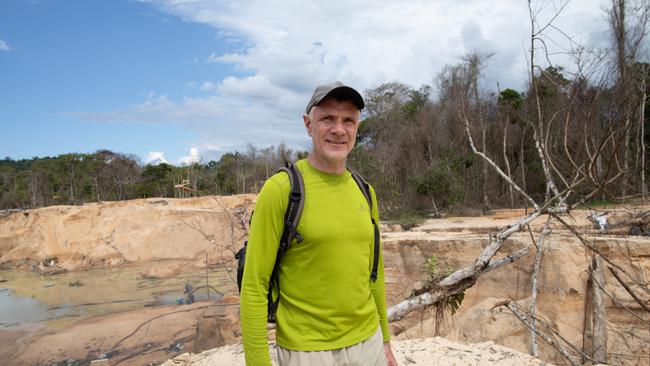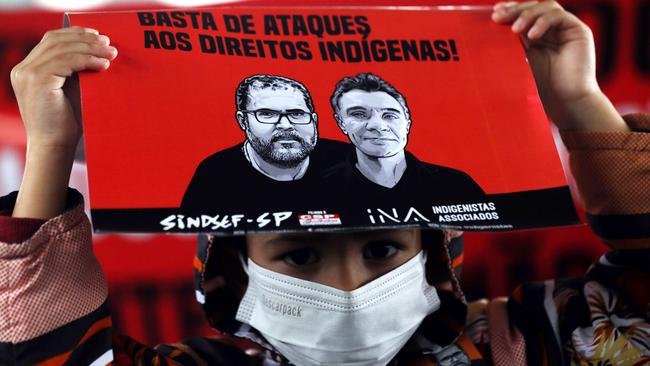Courageous reporter Dom Phillips killed for seeking truth and justice
Dom Phillips led a full life, taking risks and always wanting an honest response to well-meaning questions. Not everyone liked them.

OBITUARY
Dominic Mark Phillips Journalist. Born Cheshire, England, July 23, 1964; died Atalaia do Norte, Amazonas, Brazil, June 5, aged 57.
-
Dominic Phillips was the epitome of the inquiring journalist. Not only did he want to know the how, what, when, where and why of any story, he wanted the key players to explain themselves.
Long before he wrote of the environmental vandalism taking place in Brazil’s Amazon rainforests, he and a mate, Neil Cooper, published a fanzine in the early 1980s that covered Liverpool’s music and political scenes. Cooper remembers Phillips on the phone barking at whomsoever: “Justify yourself! Go on. Justify yourself!”
And Phillips kept demanding that of everyone he interviewed. Which is fair enough. If you can’t justify yourself, who else can?
But asking influential players in the complex and corrupt world of Brazil’s rich rainforests to justify themselves is also asking for trouble. Trouble came on June 5 when Phillips and his mate, Bruno Pereira, an expert on the country’s vulnerable indigenous tribes and also active in defending their interests, were shot dead next to a river in western Brazil, their bodies burnt and later buried.

Pereira was helping Phillips as he interviewed the remote families whose domain is the deep Amazon and whose welfare is being challenged by illegal clearing of rainforest, unlawful fishing and ungoverned goldmining. Some of them can only be reached in the wet season as the Amazon breaks its banks opening up annually remembered tributaries in otherwise trackless land. Phillips was completing a book, tentatively titled How To Save the Amazon.
There are those, such as Brazilian President Jair Bolsonaro, to whom the 235 tribes along the Amazon are a nuisance impediment to development. Bolsonaro has been described as a “tropical Trump”. He is an unpleasant, deeply sexist, gay-bating, irrational extremist and former soldier who pines for the days when thuggish military dictators ran his nation for 21 years until 1985.
It is no surprise that Phillips sided with the powerless people of the Amazon, nor that he did so with the enthusiasm with which he had cross-examined the smug bands of his Liverpool youth.
He started a university course in the early 1980s, but dropped out, guided by his restless spirit, working across Europe and Israel and coming to Australia where he picked fruit, among other jobs. His fanzine was short-lived, cobbled together with Letraset and staples. It was called The Subterranean, a nod to the Jack Kerouac novella that Phillips loved along with that era’s Beat poets and the challenging jazz of John Coltrane.
After having a peak at the world he returned to London to work for and later edit Mixmag, the music clubbers’ bible. Over eight years he increased the monthly publication’s circulation from 11,000 to 90,000 while contributing to London’s serious broadsheet newspapers with reports on a culture from which they were distant.
It was in this role that he travelled to Brazil to examine its vibrant music scene. That was 1997. Twelve years later, he returned to complete a book he had been writing on the acid house music scene titled Superstar DJs Here We Go!: The Rise and Fall of the Superstar DJ. A review described it as a “hell-for-leather, eye-opening account of how the hedonistic 90s dream of superclubs and celebrity DJs turned sour”.
He fell in love with the country and married a local woman, Alessandra Sampaio. They had two children and most recently lived in Salvador on the South Atlantic coast. On confirmation that her husband and his friend’s bodies had been positively identified, Sampaio said: “Now we can bring them home and say goodbye with love. Today, we also begin our quest for justice. I hope that the investigations exhaust all possibilities and bring definitive answers on all relevant details as soon as possible.”
His old Subterranean colleague Neil Cooper wrote: “If ever there was anyone who should be forced to justify themselves, it is those culpable in his and Bruno Pereira’s disappearance and murder at both a political and criminal level. In the meantime, the world just lost two of the finest minds of their generation. Justify that.”
One of the early reports Phillips filed when he moved to South America was an interview with the family of a Brazilian electrician Jean Charles de Menezes who was shot dead in 2005 by London police while travelling on the city’s underground. They had mistaken him for a terrorist. The injustice shocked Britain. In 2008, Phillips sat with Menezes’s mother and wrote in The Times: “Maria de Menezes, angry tears edging her eyes, asked me, again and again, ‘Why did they do it? Why did they kill my son?’ ”
A grieving family in England this week is asking the same.




To join the conversation, please log in. Don't have an account? Register
Join the conversation, you are commenting as Logout